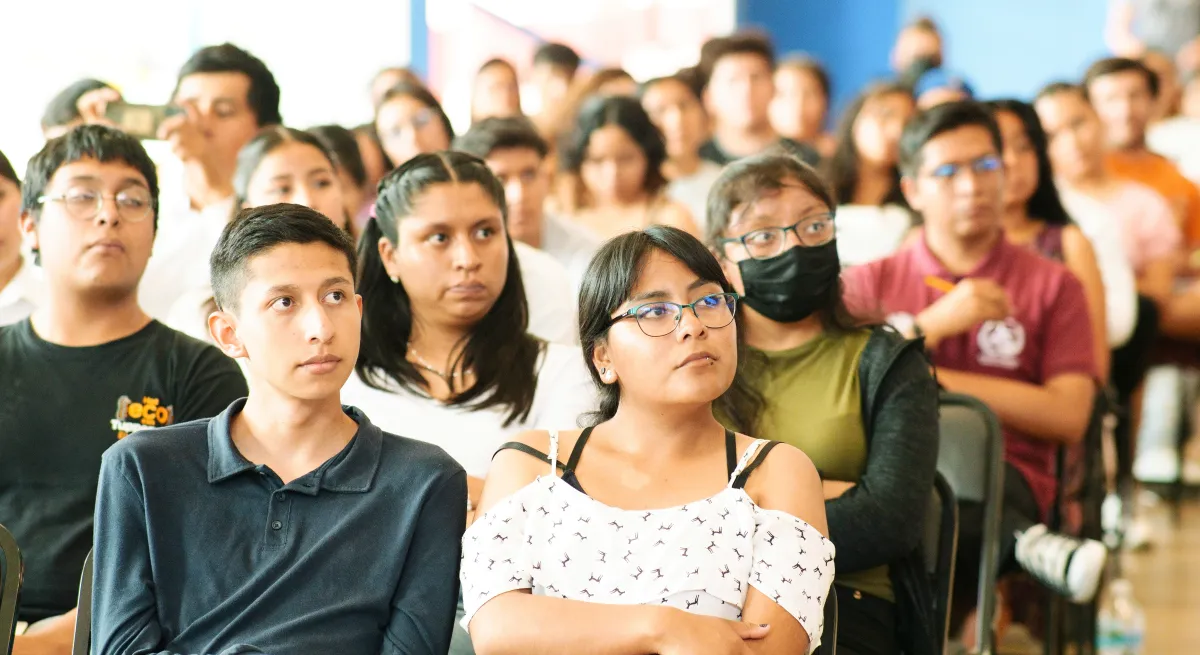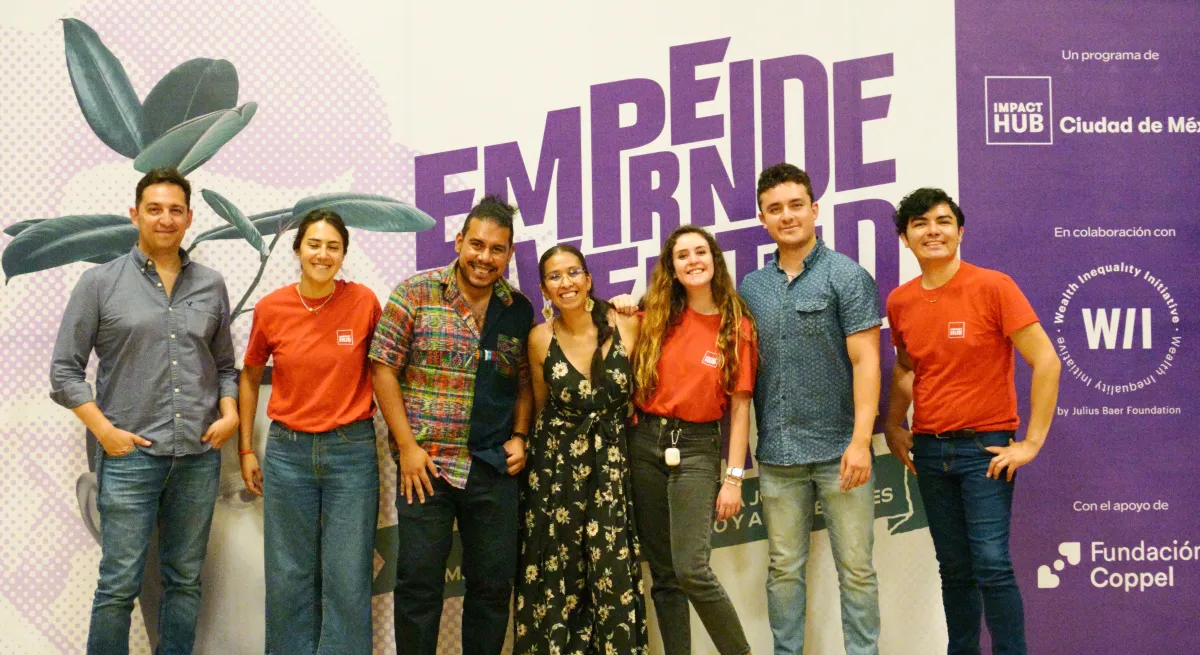Impact Hub Ciudad de México aims to create new businesses and a support network to generate employment and increase income for youth, women, and indigenous people. This is achieved through providing greater social capital and support for entrepreneurial projects, which reduces the risk of failure during the early years of start-up.
The project is supported by the Julius Baer Foundation, focusing on inspiration, capacity development, quality training, and the strengthening of entrepreneurial projects. Each cohort is supported and accompanied by an advisory group and a community of successful regional entrepreneurs and business experts.
In an exclusive interview, Impact Hub Ciudad de Mexico's programme manager, Genaro Ríos, provides insights into the organisation's approach, how they address challenges with diverse indigenous groups and communities, and why Impact Hub is committed to entrepreneurship and youth inclusion.
Q: Genaro, Impacto Hub Ciudad de México is part of a global network working towards a just and sustainable society. How do you leverage this global platform to enhance the local impact of your project, especially in addressing wealth inequality in communities like Zacatlán and Atlixco?
A: We think globally and act locally, leveraging the global knowledge generated by the Impact Hub global community to implement what is useful in our local cases. The same will happen with the case of Atlixco and Zacatlán; we will take the lessons learnt so they can be adopted and scaled by the rest of our network.
Through the global Platform, we have access to a support network, opportunities, and resources that we can connect with the participants in these programmes.
Q: Your focus on capacity development, quality training, and the strengthening of entrepreneurial projects aims to reduce early-stage business failures. How does your organisation tailor its training and advisory programmes to address the unique challenges faced by disadvantaged groups, particularly in the indigenous communities?
A: At Impact Hub, we have a methodology specifically designed to support early-stage ventures. We focus on this stage because the data indicates that 8 out of 10 Mexican companies fail within the first 2 years of existence. This alarming figure means that most entrepreneurial talent is lost in this initial stage. We designed this methodology precisely with these ventures in mind, adapting it to the specific contexts where we implement it.
The truth is that we don't change the methodology when working with vulnerable populations compared to more privileged ones. What we do adapt are the examples we use so that they can understand our case studies or methodologies more easily. In addition, we have found that many of the skills required for entrepreneurial success—such as personality and character traits—are already possessed by these individuals. Skills like managing emotions, handling frustration, making a sale, negotiation, managing inventory, or maintaining a budget are things that people in vulnerable situations face daily. So, we harness these important entrepreneurial skills and further develop them within these contexts.
Inequality is a phenomenon that occurs and the cause and lack of opportunities is not exclusive to economic chances, but also has to do with distribution opportunities. We must promote social and intellectual capital
Q: With the support of the Julius Baer Foundation, Impact Hub Ciudad de México is targeting the state of Puebla to train a new generation of entrepreneurs. Can you elaborate on the specific challenges you encounter in this region, and how your initiatives are tailored to overcome these obstacles?
A: The case of Puebla is quite special. Why? Because Puebla is a state with tremendous inequality among its population. Puebla is the fourth poorest state in the country, yet its capital, the city of Puebla, and surrounding areas, such as municipalities like Cholula, have some of the wealthiest people in the country. The state has a wealth of resources, both natural and infrastructural, and significant foreign investment with automotive plants like Volkswagen and Audi. Despite all this, the Sierra of Puebla is home to the poorest population in the country. This highlights a severe inequality and an inequitable distribution of resources. This is why we chose Puebla for our focus.
The main challenges we face in Puebla include a high rate of migration, especially among young people, due to the lack of opportunities in their communities. This constant social inequality has social consequences, such as frequent protests, which sometimes make access to places like Zacatlán or Atlixco difficult due to roadblocks by farmers and agricultural groups. Another obstacle is that we conduct virtual follow-ups with our young people in the incubator, but some of them do not have internet access where they live. Another challenge we faced at the beginning is the scepticism of the people because many entities, primarily government but also companies, had approached these communities only to exploit them. These communities have a deep distrust of anyone offering help.
To address this, we have worked to decentralize the entrepreneurial ecosystem, which is highly concentrated in Mexico City, and bring these opportunities and social capital closer to the young people in Puebla. Regarding roadblocks, it's a matter of luck and planning our trips in advance. In terms of gaining the trust of the community, over time we have earned the trust of the youth, municipal officials, the main educational centres and the local government, enabling us to operate more effectively with their support.
We have successfully engaged with the community in Puebla, both in the city and the broader region. The young people now attend our incubation sessions with a positive attitude, not out of obligation, but because they see the value in what we offer.

Q: Impact Hub Ciudad de México has been instrumental in generating employment and increasing income among youth, women, and indigenous communities. Can you share some success stories from these demographics that illustrate the impact of your inclusive entrepreneurship initiatives?
A: Of course, with pleasure. I have had the enormous privilege of working with female entrepreneurs who now have successful and growing businesses. I will share two cases with you.
The first is the case of Leti, Leticia Jimenez Ramos, who has a venture called Piñuela. Piñuela produces personal hygiene products such as solid shampoos, soaps, and creams. All of her products are made with organic materials and based on a principle of local economy. What is great about Leti is that she sources her workforce by forming alliances with centres that provide shelter to women who have experienced violence. She partners with these shelters, employing women who have been victims of violence. This is to help them achieve economic independence and distance themselves from their aggressors, which is very important. Leti hires them for six months, trains them, gives them a job, integrates them, and after six months, she hires a new group of women and supports the ones who leave so they can start their own ventures or become part of her value chain, whether in commercialization, production, design, or any other area required by Piñuela.
Leti participated in a project we have called Emergente, in which we visited communities in Yucatán to bring these entrepreneurial ecosystem opportunities to them. I am not aware of any other organisation in Mexico that reaches these communities, truly engaging with populations that have been abandoned in many respects. It makes me very happy to have found Leti in one of these communities, to support her venture, which was in its early stages at the time but had great potential, and to help it grow and consolidate. Today, Piñuela is a well-established brand, shipping nationwide and even internationally, with regular and corporate clients. She has become an example of female entrepreneurship in the state of Yucatán, and we at Impact Hub are very proud of this success story.
Another success story from our Emergente programme is the case of Ricarda, who, along with a group of women, has a company called Nayé Ancestral. This company produces ointments and balms for bruises, rashes, sore gums, and similar ailments. What's remarkable about them is that they come from a very vulnerable community in the state of Oaxaca and have organised as a group of women to create this company. Nayé Ancestral also revives ancestral Zapotec traditions from their communities by using natural ingredients. Everything is based on herbal medicine and medicinal plants, knowledge passed down through generations, and they now use this knowledge to commercialize these ointments.
All the plants used to make these ointments come from a garden they maintain and care for, as well as some wild plants they collect in the region. They have a strong commitment to environmental care and operate a top-tier company. These ointments are excellent and sales have been growing exponentially since she participated in our programme.

Q: The intervention in municipalities like Zacatlán and Atlixco aims to empower young people to create opportunities within their communities. What role does mentorship and access to a broader entrepreneurial ecosystem play in sustaining these local businesses and ensuring their long-term success?
A: The mentor network is one of the main elements of this programme. Through this network, we aim to bring social capital to the young people of Atlixco and Zacatlán, as well as decentralize the entrepreneurial ecosystem and bring it closer to these two municipalities in Puebla. The mentor network is composed of directors, founders, and executive level professionals from well-known national and some international companies. These individuals are part of Mexico's top 1%, and what we aim to achieve with them is to generate a bond between mentors and mentees so they can help them develop their projects not only with theorical knowledge, but also facilitating access to providers, finance, and other opportunities.
